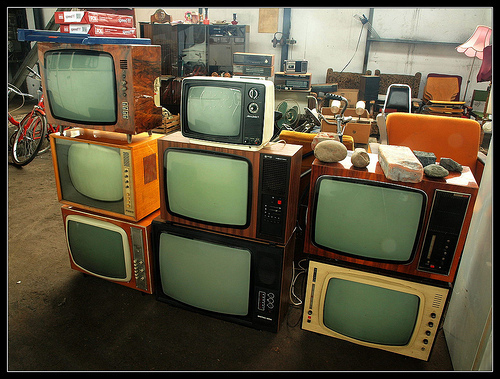The Script Cabins: Writing for TV 101

We’re rolling out the red carpet to the Script Cabins at Camp NaNoWriMo. This is the fourth and final guide for all you future screenwriters, playwrights, and graphic novelists, and we’re tackling that most familiar of mediums: television!
There’s not a person writing television today who didn’t start off sitting alone at their desk, wondering who the heck they were trying to fool. What made them special is that they didn’t give it up.
If you’ve never written a TV script before, fear not. As you move through the pointers below, you’ll probably realize that most of them are already second nature:
To Spec or Not To Spec
Ten years ago, if you wanted to be a TV scribe, you had to start by writing fake episodes for existing shows on “speculation” of purchase, or “on spec”. Today, executives are just as likely to ask for a pilot script as they are for a spec. Some even prefer pilots to spec scripts, as pilot scripts tend to show off the unique voice of a new writer.
Still, each is a useful tool in marketing yourself as a writer, so the question comes down to what you want to write.
Know Your Show
If you’re thinking about writing a spec, start by focusing on a fresh, highly-rated show currently airing within a genre that you love. Once you’ve targeted a show, get your hands on a written episode using websites like Daily Script, and format yours as similarly as possible.
If you plan to write your own pilot, start by watching shows you think might be similar. Make note of how they’re structured and what types of situations comprise the main storylines.
What A Character!
Television writers keep their audience hooked with strong characters. Knowing your characters inside and out is fundamental to good story structure and dialogue.
Try writing who you know, but without the boring stuff. Drop your dad, or your girlfriend, or your sixth-grade math teach into the mix, and see how they fare next to your shape-shifting alien or talking dog
TV characters should be crystal clear and set up in obvious conflict with others in the very first episode. Your job is to keep this initial dynamic familiar. If you’re writing a spec, do not try to take the show in a bold new direction—stick to the characters the way they are.
Talk the Talk
Before worrying about how to make your characters talk like they’re in a TV show, you’ll need to give them something to talk about. If you know your characters and their goals, your dialogue will begin to write itself.
Remember: there is a real difference between “dialogue” and “conversation”. Your characters should be sharper and quicker than most of us are in real life. Always be sure to read your lines out loud. You’re not writing a novel—these words are meant to be spoken, and you may be surprised by how differently dialogue can play outside of your head.
House of Cards
Whatever type of script you’re writing, it’s helpful to think about your story in terms of several acts broken up by commercial breaks.
Half-hour sitcoms tend to unfold in the following manner:
Teaser
Act 1
Act 2
Tag
Whereas hour-long shows usually unfold like so:
Teaser
Act 1
Act 2
Act 3
Act 4
The rule of thumb is that one page of writing generally equals just under one minute of air time, so hour-long dramas tend to be about sixty pages long, and half-hour network shows tend to be about twenty to thirty pages.
Learn Your ABC’s
Think about your script as traveling down two or three separate roads at the same time. Your A-plot fuels the actions of the main characters and pushes the story along. Your B-plot expresses the emotional entanglements and problems of your main characters. Hour-long shows have a C-plot, focusing on the parallel lives of supporting characters.
Each of your acts should contain a 60/30/10 breakdown of your A, B and C-plots, respectively. In a half hour show with no C-plot, the ratio should be closer to 60/40.
The A, B, Cs are negotiable, but this next rule is not: Each act must end in a genuine ‘cliffhanger.’ Always arrange your scenes so that your big, juicy moments fall just before your breaks.
The Fun Is In The…
Writing should be fun! Whatever your reasons for starting down this path, they probably haven’t changed. Writing is awesome. And you’re awesome for wanting to be a writer. So no more procrastination! Back at it, my friend: we’re almost ready to start!
Adapted from Script Frenzy’s “Intro to TV Scripts” guide.
Photo by Flickr user Rantes.
Chris Baty's Blog
- Chris Baty's profile
- 63 followers



